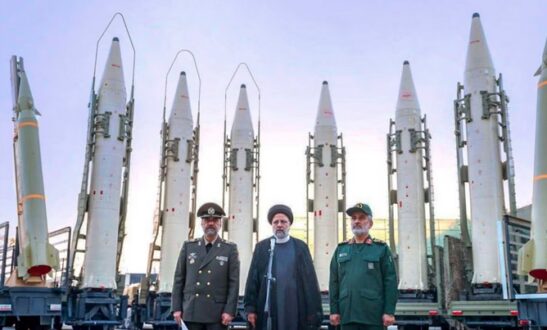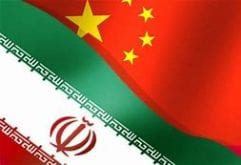rferl.org – Since Israel launched its war in the Gaza Strip, Iranian-backed militant groups have attacked Israeli and U.S. targets across the Middle East in a show of support for Palestinians.
While Iran has flexed its muscles in the region since the war erupted in October, Tehran has avoided taking direct military action against Israel and its key ally, the United States.
Experts say the Islamic republic sees a direct war against its archfoes as a threat to its fragile domestic stability and its own survival.
Iran has “so much to lose in a short-term war,” said Alex Vatanka, director of the Iran Program at the Middle East Institute in Washington. “[It] brings in all sorts of questions about the future of the Islamic republic.”
A Matter of Survival
The possibility of a direct U.S.-Iranian military confrontation
increased after a Tehran-backed militia in Iraq killed three American
soldiers in a drone strike in Jordan on January 29.
But Tehran has struck a conciliatory tone since the attack, wary of U.S. strikes on Iranian territory.
Iranian President Ebrahim Raisi said on February 2 that the country
“will not start any war” but will respond strongly if “anyone wants to
bully us.”
Raz Zimmt, a senior researcher at the Israel-based Institute for
National Security Studies (INSS), said that regime survival is the
clerical establishment’s “top objective” and any war with Israel and the
United States would be an existential threat to the Islamic republic.
The Iranian establishment has had to contend with multiple domestic
crises in recent years, including rising civil unrest and a faltering
economy.
The September 2022 death in police custody of Mahsa Amini — detained
for allegedly not properly observing Iran’s strict dress code for women
— sparked months of deadly nationwide protests that posed one of the
biggest challenges to the Islamic republic in decades.

The authorities cracked down on the demonstrations, killing hundreds and arresting thousands of protesters.
The clerical establishment has long maintained that it derives its
legitimacy from the will of the people. But that claim has been
increasingly questioned in recent years.
The parliamentary elections in 2020 and the presidential vote in 2021
saw record-low turnouts, with less than half of eligible voters casting
their ballots in both elections.
There are similar concerns about a poor turnout in the upcoming
parliamentary and Assembly of Experts elections scheduled for next
month.
The authorities have also grappled with a worsening economy that has
been crippled by international sanctions and government mismanagement,
leading to soaring inflation, rising unemployment, and growing poverty.
“Foreign policy decisions are not directly impacted by public
opinion,” Zimmt said. “Nonetheless, the regime’s need to prevent
needless domestic disturbances in Iran undoubtedly shapes its choices.”
Military Prowess
For years, Iranian military officials have bragged about the country’s
arsenal of drones and missiles. But experts say Iran lacks the military
prowess to challenge Israel and the United States.
“Iran is well aware that Israel has a clear operational and intelligence
advantage over it in a direct military conflict, both defensively and
offensively,” Zimmt said.
Aside from having a conventionally superior military, Israel also has a
nuclear deterrent, said John Krzyzaniak, a research associate at the
Wisconsin Project on Nuclear Arms Control.
Israel is widely believed to possess nuclear weapons, with the Washington-based Nuclear Threat Initiative estimating that Israel has around 90 nuclear warheads.
Under decades of sanctions, Iran has invested heavily in developing
domestic weapons programs, resulting in cheap and effective drones and
missiles.
Iranian officials have boasted
that some of its weapons have been developed specifically to hit
Israel. For example, officials have claimed that a Fattah ballistic
missile can reach Tel Aviv in 400 seconds.
For the time being, Iranian concerns
about engaging in direct confrontation with Israel seem to outweigh its
desire to exact revenge.”
— Raz Zimmt, Israel-based Institute for National Security Studies
But Vatanka said this is only “psychological warfare against the
Israelis” and meant to “enhance the Islamic republic’s image” as the
“sole guardian or promoter of the Palestinian cause.”
Krzyzaniak stated that Iran’s missiles can “pose a serious threat” to
Israel while its attack drones like the Shahed-136 can “wreak havoc on a
civilian population” if fired in large numbers. But he said Israel
still maintains military superiority.
That is why, Krzyzaniak said, Iran will continue to rely on unconventional warfare and its asymmetric capabilities.
“A guerrilla warrior never attacks the enemy head on,” he added.
By using the so-called “axis of resistance,” Iran’s loose-knit network
of proxies and militant groups who aid it in opposing Israel and the
United States, Tehran “reduces the possibility of Iranian casualties and
significant assets being damaged” inside the country, according to
Zimmt.
This allows Iran to “fight Israel through its regional partners on multiple fronts, albeit with a restricted scope,” he said.
Experts say that Iran’s reluctance to avenge the deaths of at least 10
members of the Islamic Revolutionary Guards Corps (IRGC) in suspected
Israeli strikes in Syria and Lebanon since early December further
strengthens the argument that Tehran wants to avoid a war.
Last month, Iran carried out missile strikes on targets in Syria, Iraq,
and Pakistan that were widely seen as a warning to Israel and the United
States.
But Zimmt said Iran has avoided an escalation that would lead to a war with Israel and the United States.
“For the time being, Iranian concerns about engaging in direct
confrontation with Israel seem to outweigh its desire to exact revenge,”
he added.
 Shabtabnews In this dark night, I have lost my way – Arise from a corner, oh you the star of guidance.
Shabtabnews In this dark night, I have lost my way – Arise from a corner, oh you the star of guidance.



